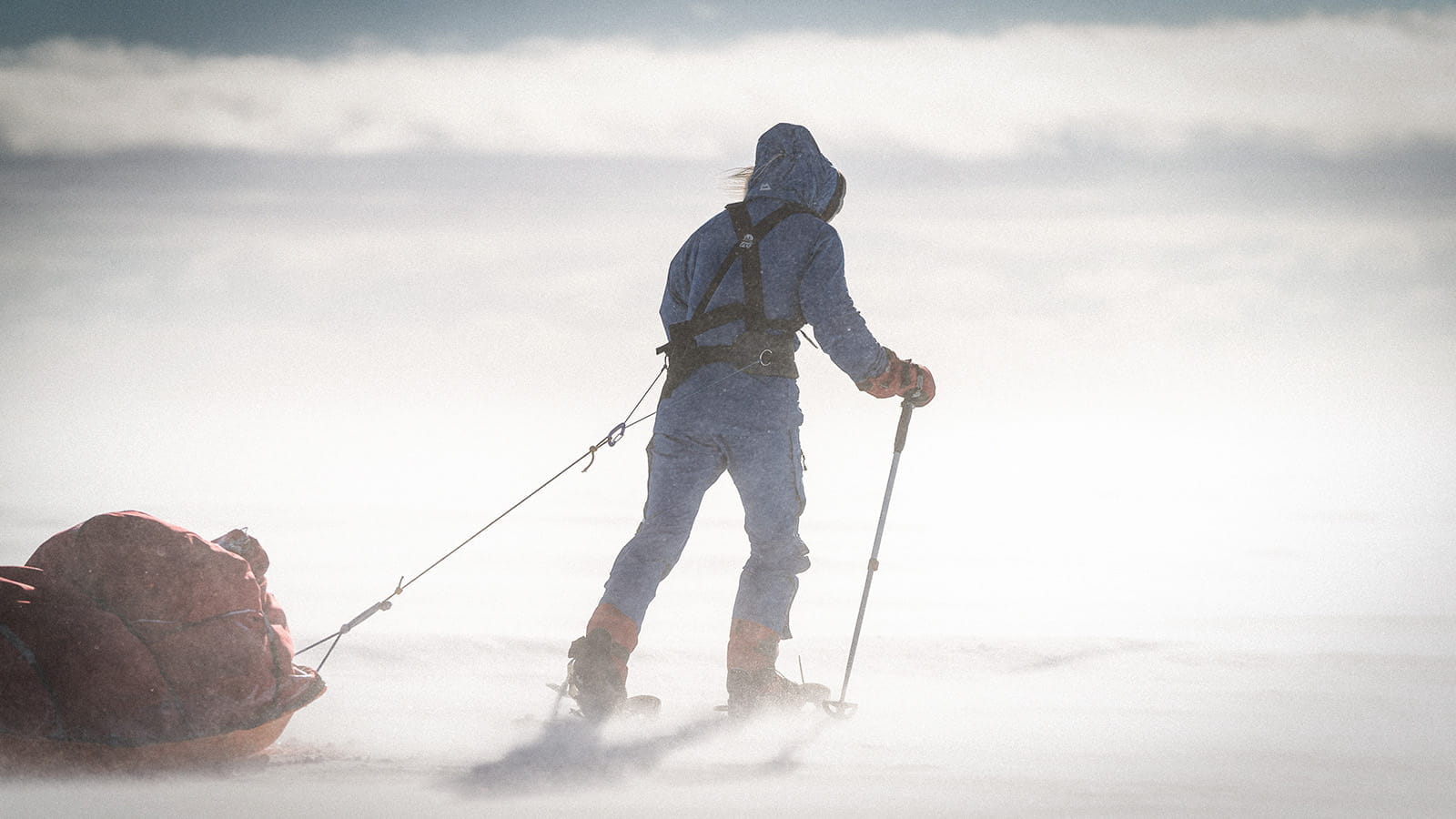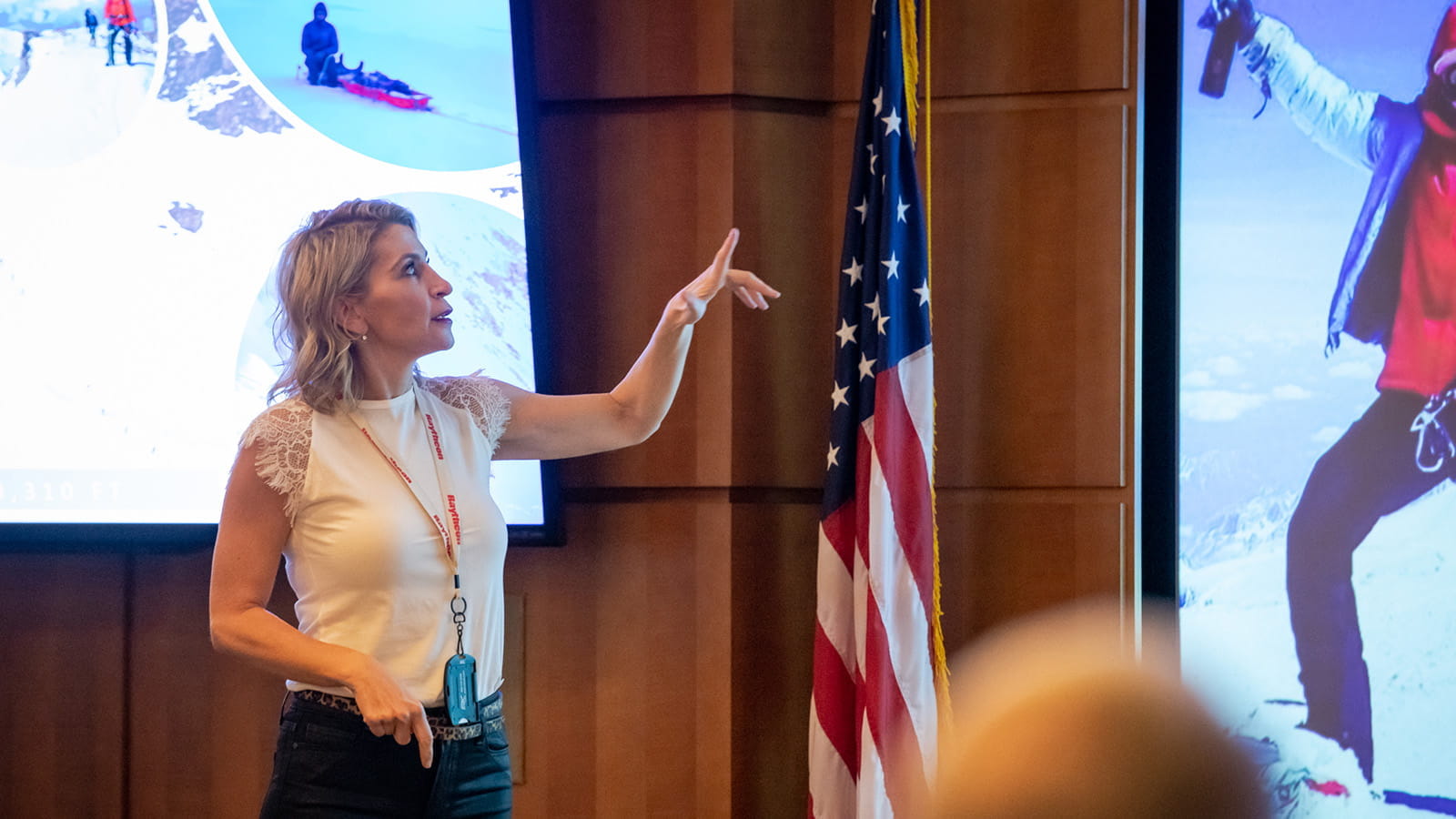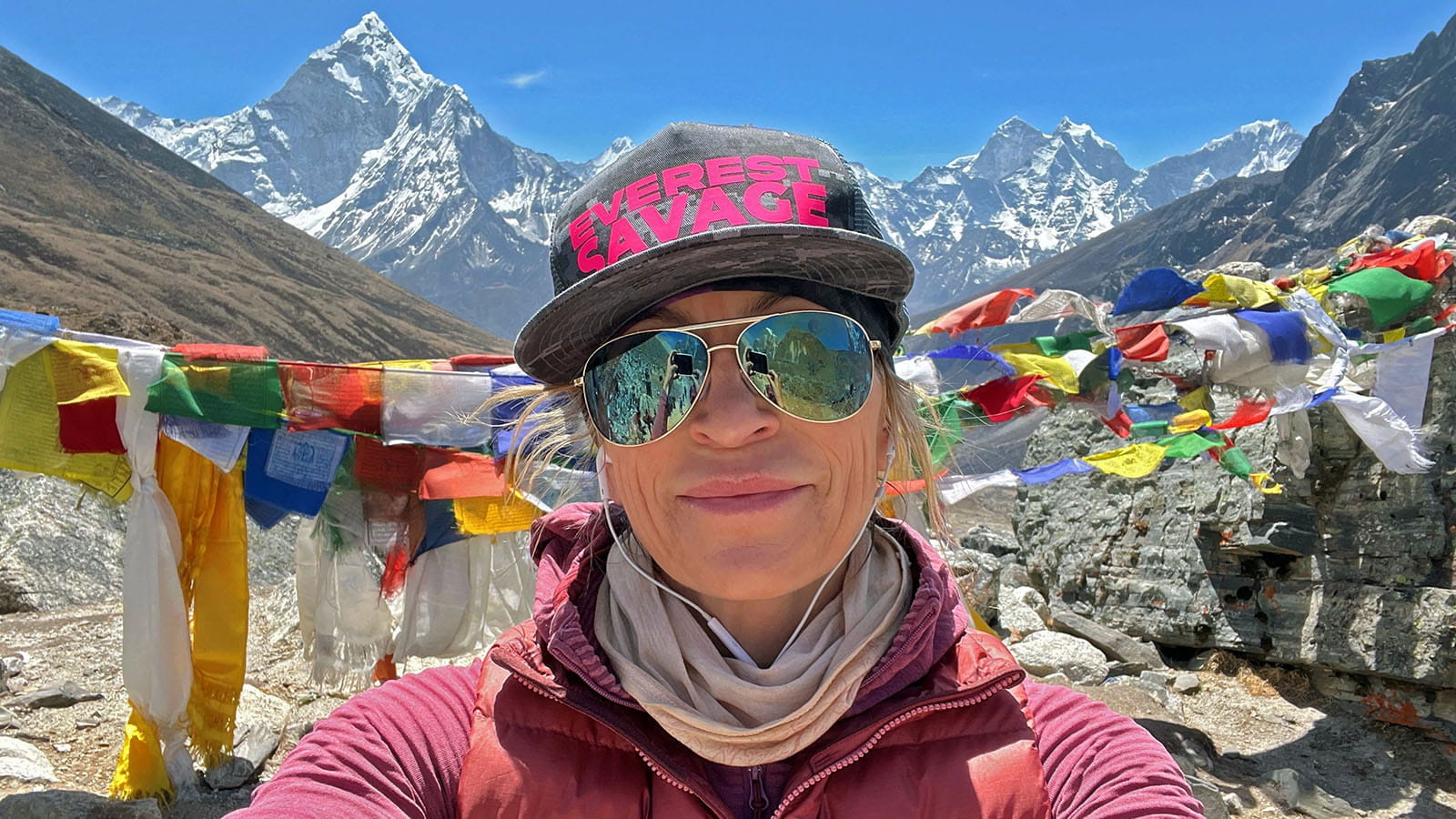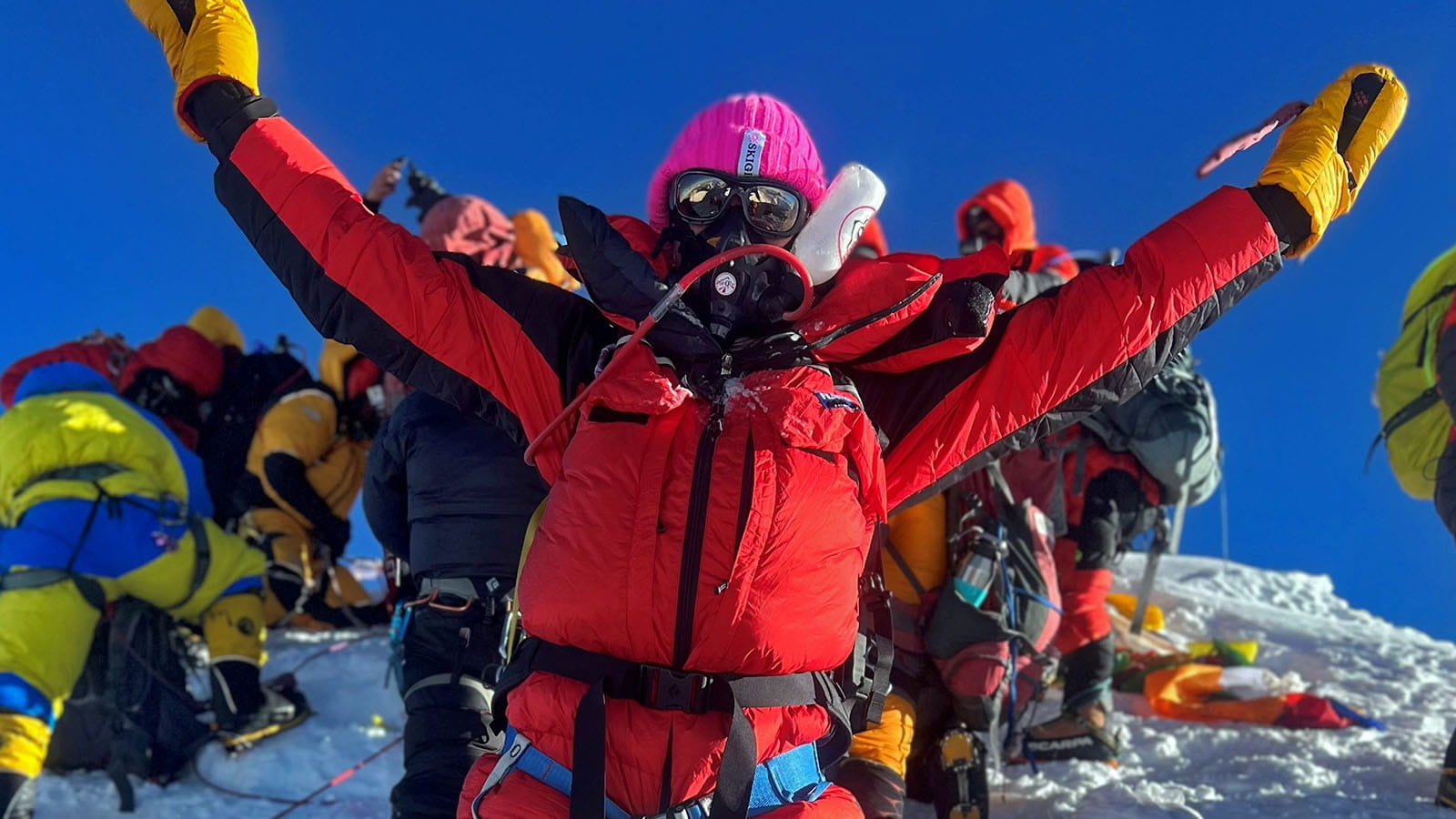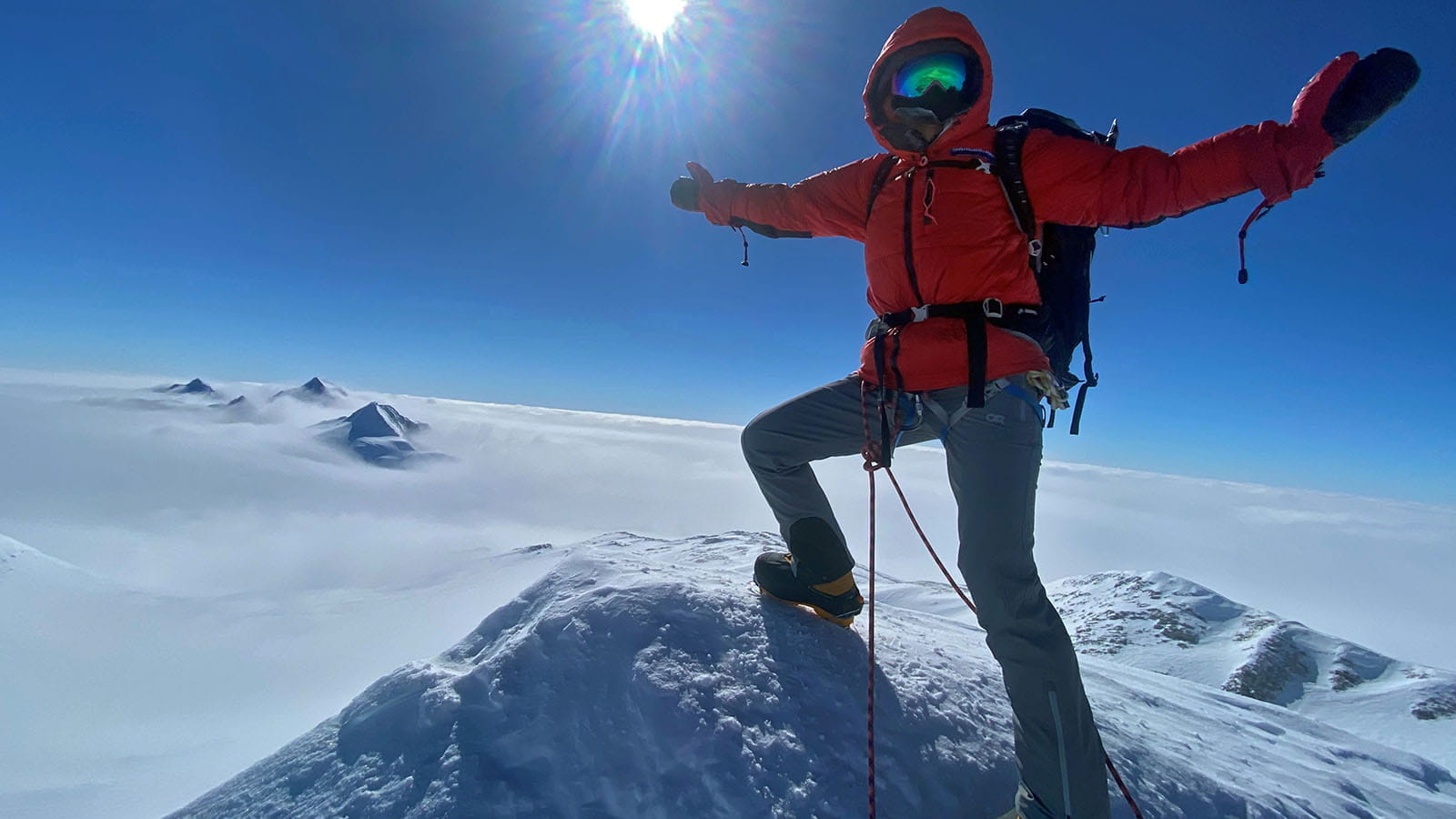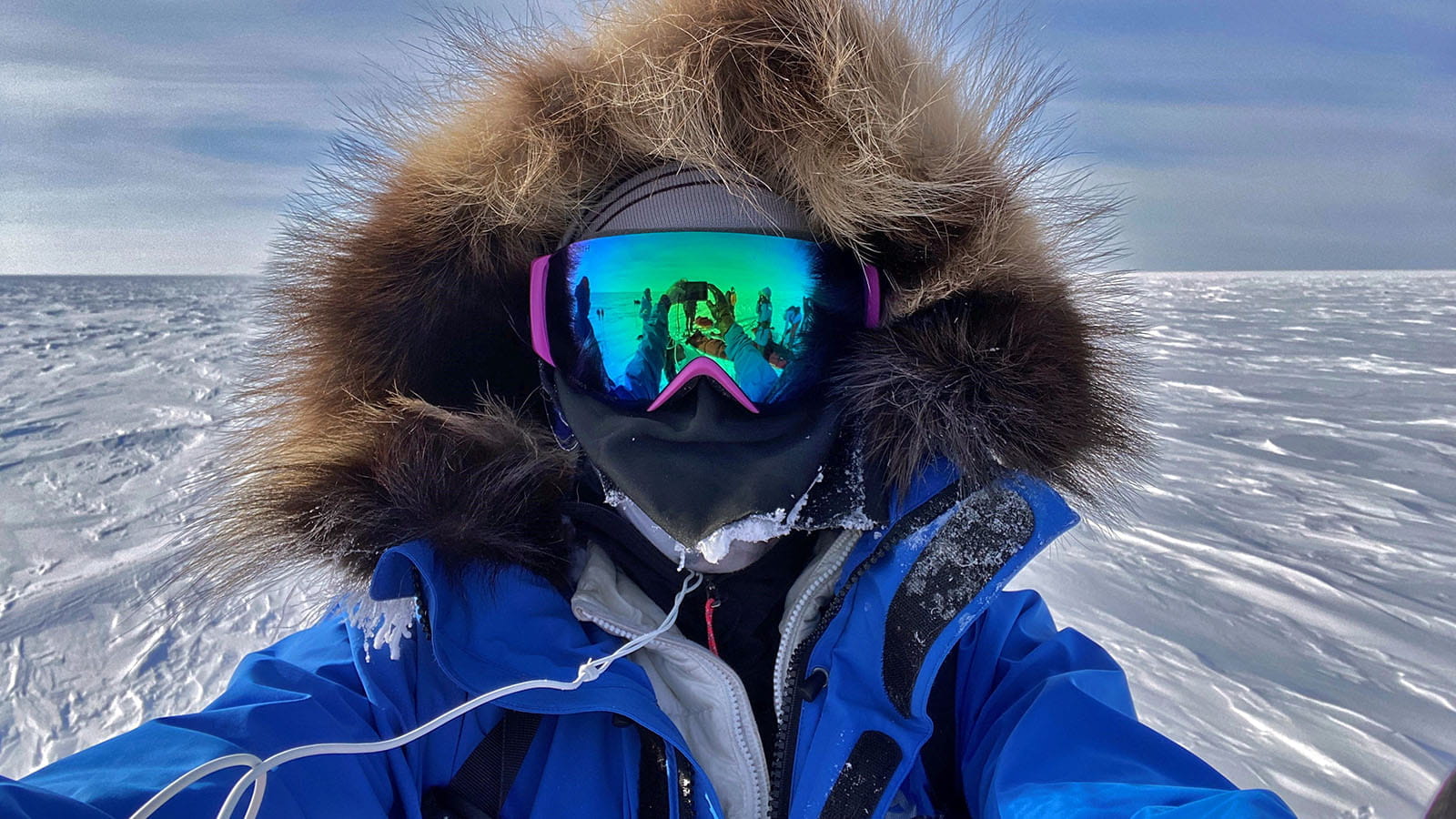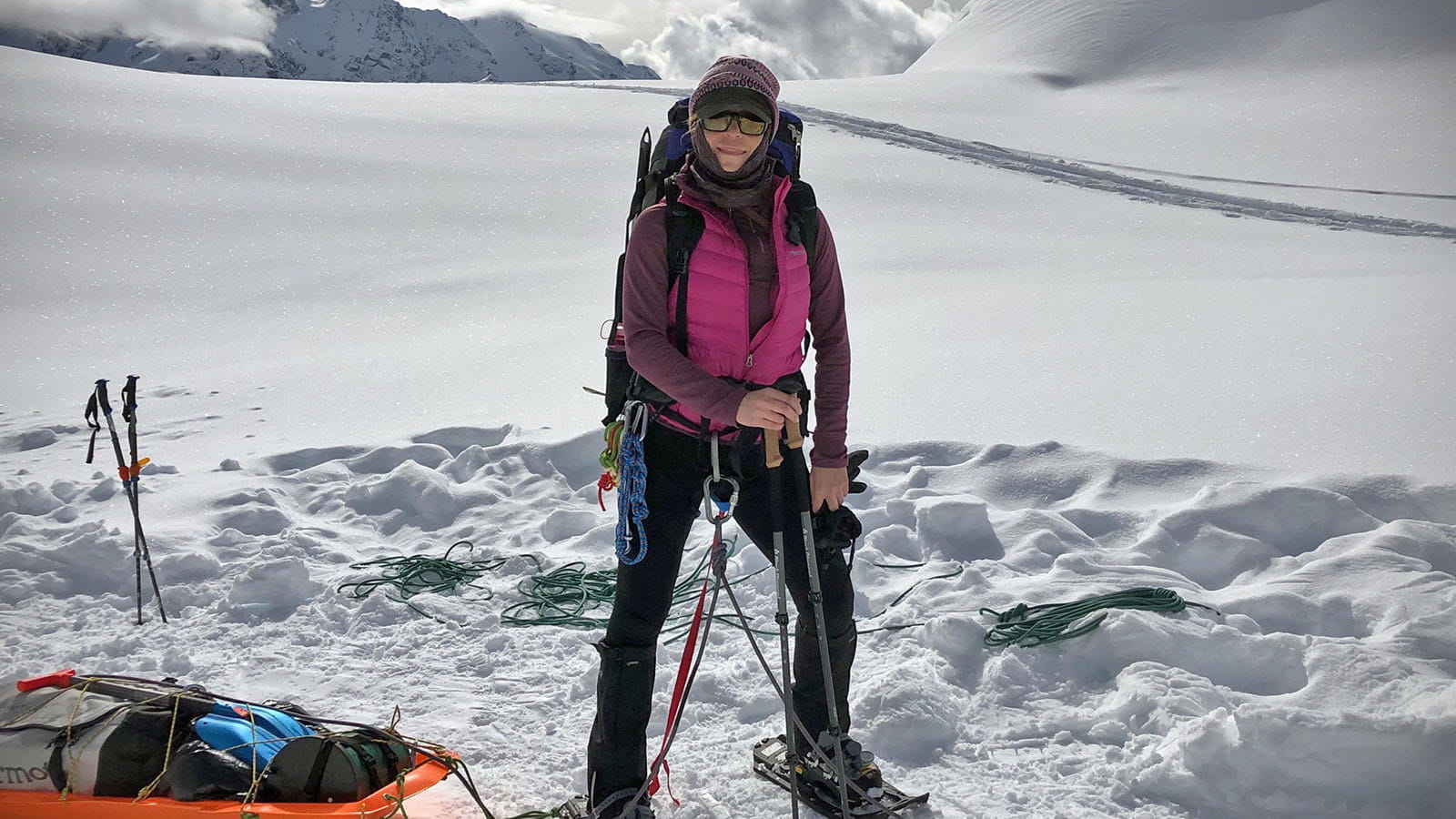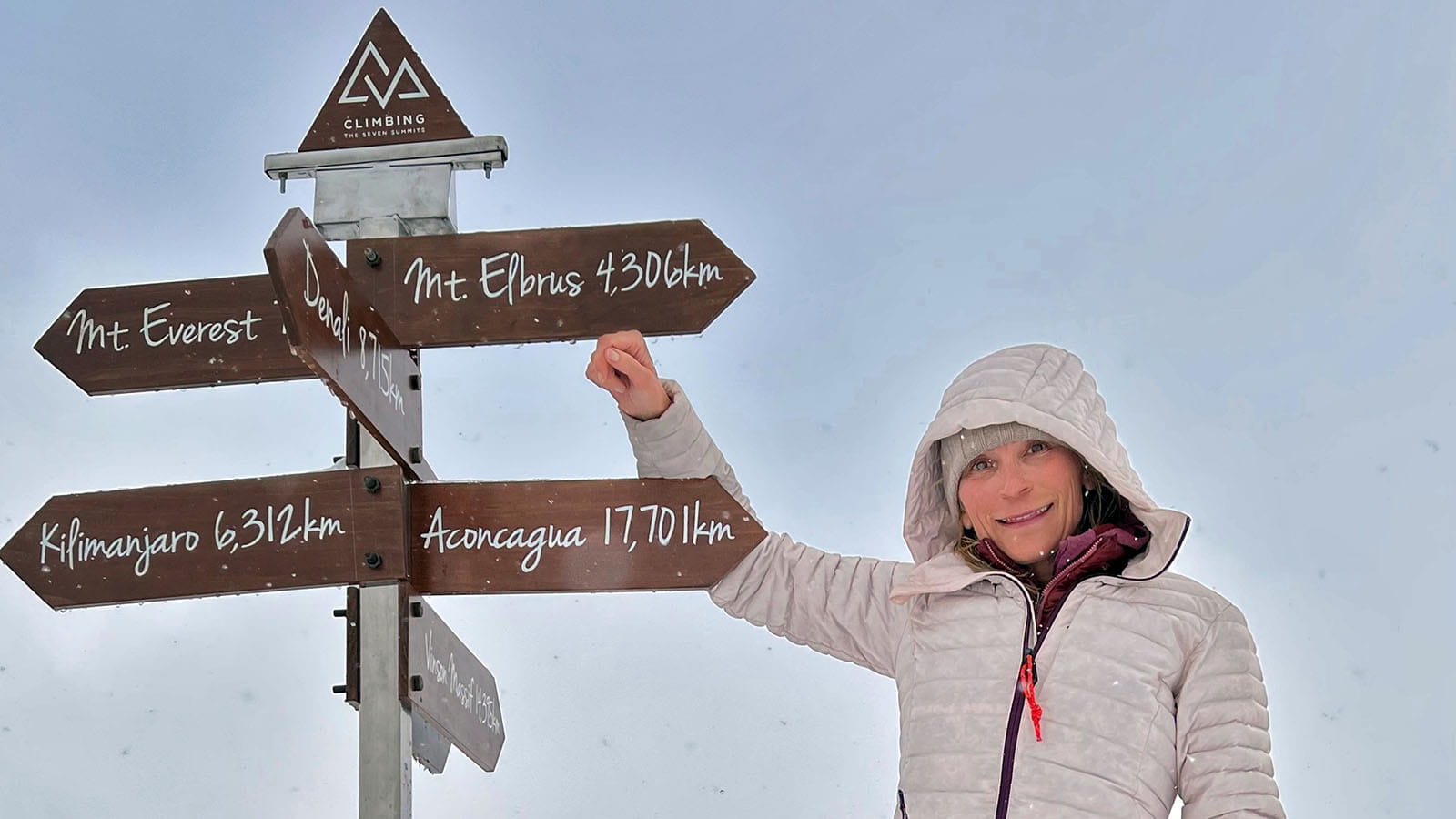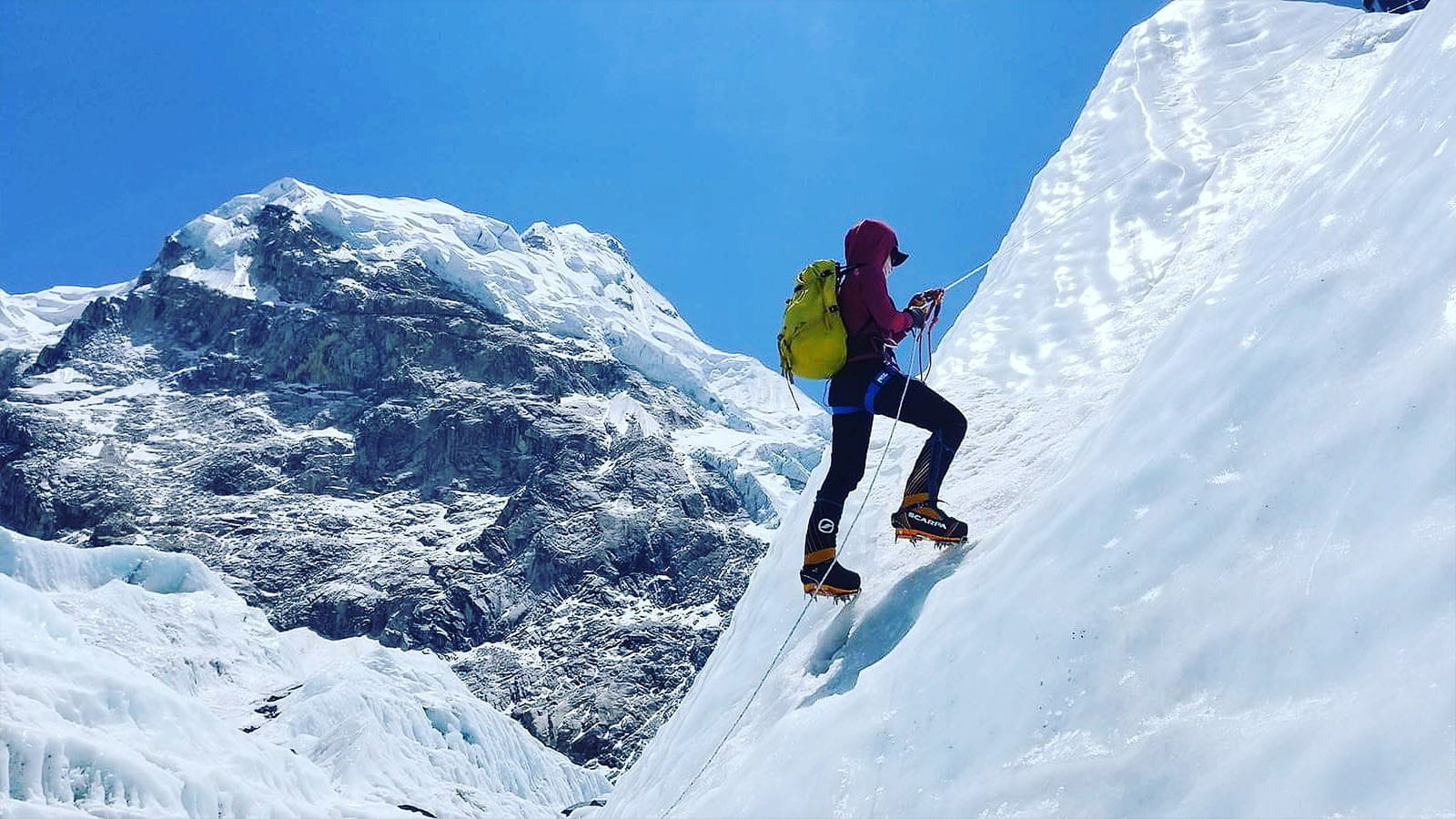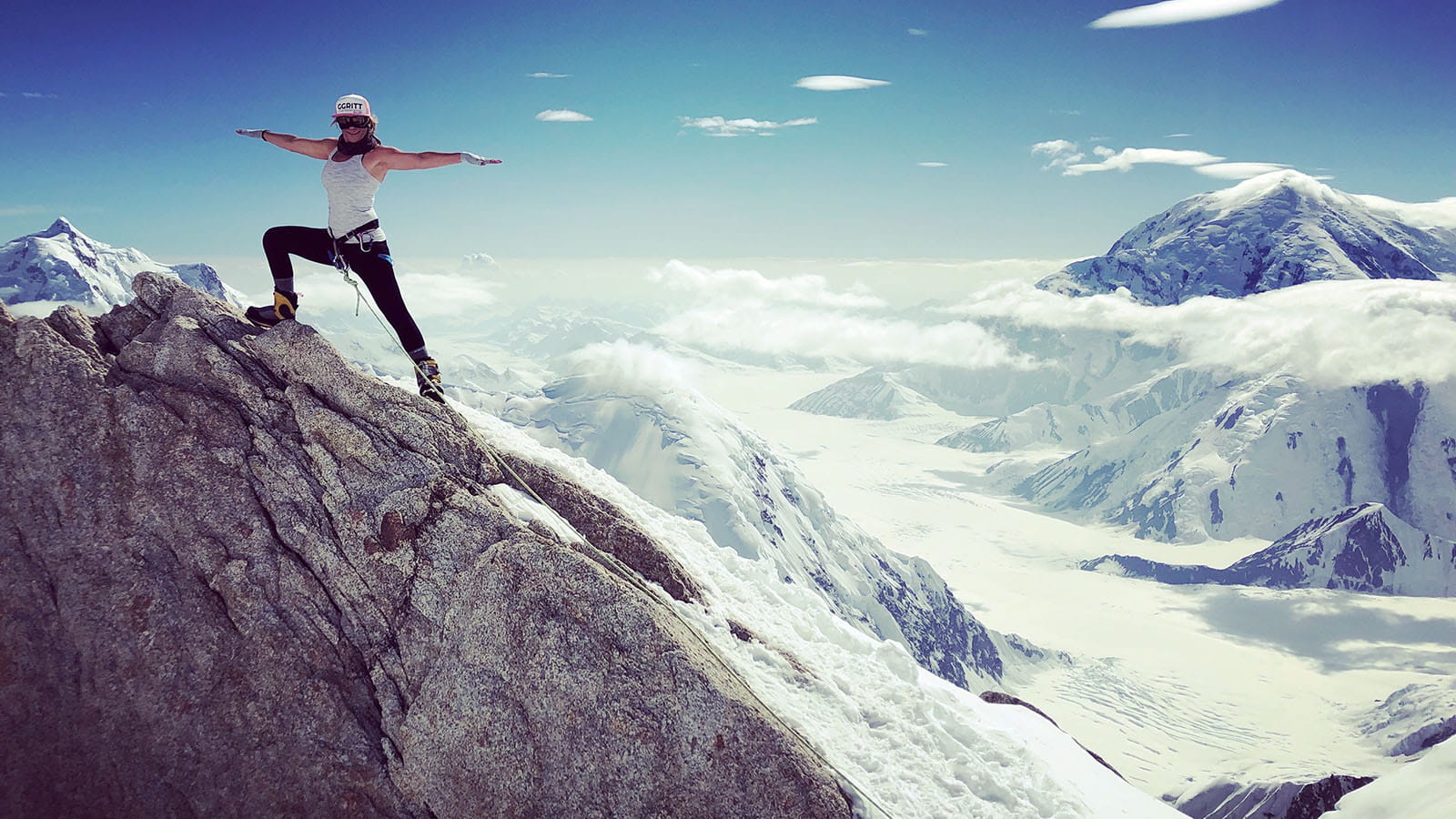Ain’t No Mountain High Enough
Aerospace engineer’s career and personal life is far from peaking
About the only thing Meghan Buchanan ever gave up on was the idea of giving up itself.
She didn’t give up when she was diagnosed with dyslexia as a child and her teacher told her mom she’d never excel academically.
She didn’t give up in college, where the demands of heavy, dense reading “swallowed me up” and forced her to retake classes.
She didn’t give up when a snowboarding accident severely shattered her femur and left her in excruciating pain far longer than her doctors expected.
And Buchanan, a Systems Engineering Integrated Product Team Lead at Raytheon Intelligence & Space, a Raytheon Technologies business, isn’t giving up on her latest quest: climbing the highest peak on each continent and Last-Degree Ski to the center of the North Pole and South Pole.
“You don’t have to be a rocket scientist to climb Mount Everest. But it helps to have rocket fuel for blood and a lot of grit to reach the summit.”
Meghan Buchanan | Systems Engineering Integrated Project Team Lead for Future Sensor and Signal Solutions | Raytheon Intelligence & Space
On Dec. 15, 2022, she became the first “rocket scientist” and one of less than 100 women to complete the Seven Summits; however, her journey to climb to the top began as a child.
When she was in the second grade, she was a diagnosed with dyslexia, a learning disability that impairs the ability to read and spell. Teachers told Buchanan’s mother that she’d never excel academically or professionally.
“My mom didn’t buy into that,” Buchanan said. “She sat me down and said, ‘Sweetheart, you can be anything you want to be. You’ll just have to work harder than everyone else. And that starts today.’ And that’s where I get my tenacity. The embarrassment, shame, insecurities, discrimination and repeatedly being told ‘You can’t...can’t...can’t...’ forced me to develop resilience early. I had to accept failing repeatedly, and then choosing to get up for more.”
Buchanan’s mom was right. Meghan Buchanan did well in high school, graduating in the top 10% in her class by paying close attention and learning verbally, which came easy for the articulate teenager. It was in college, with its demand for heavier, denser reading, where learning became a real struggle.
“It swallowed me up, but I kept fighting,” she said. “I had to take Calc 2 three times, but I wanted it so badly. I kept going and earned my degrees. Having endured the struggle, I quickly learned I had skills other engineers didn’t have. Because I've had to be fast on my feet, and never give up, I’d actually make a really great manager. I did that by just sticking in there, gritting it out and figuring out a career path that suits my strengths.”
Now in her 40s, Buchanan is the Systems Engineering Integrated Project Team Lead for Future Sensor and Signal Solutions radar systems at RI&S.
Not only was Buchanan’s career ascending, so was her favorite pastime – climbing. She said that she found solace in hiking the peaks of Colorado with her father as a little girl, and in 2005, she and her dad climbed the 19,341-foot Mount Kilimanjaro in Tanzania, Africa.
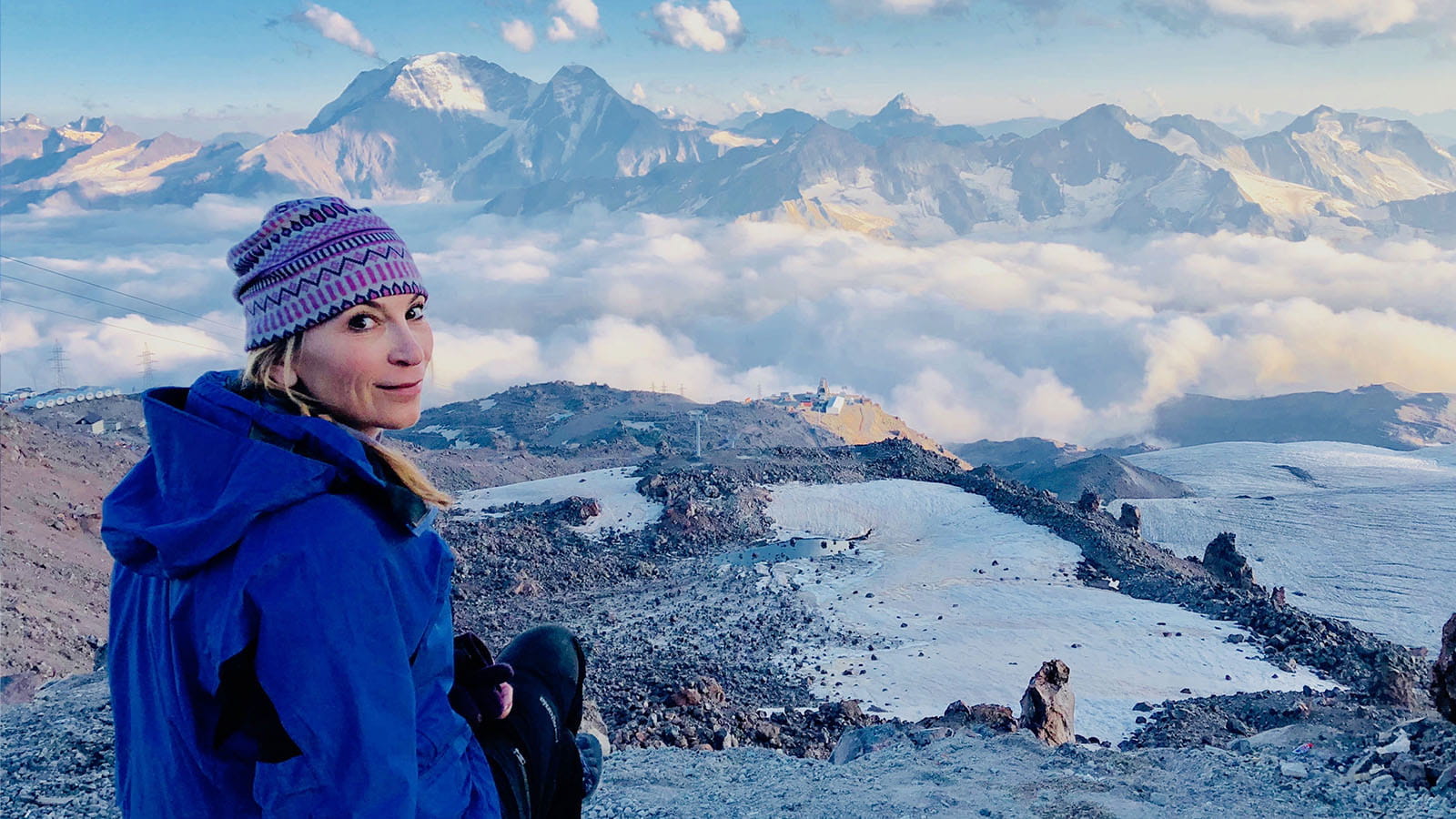
Buchanan takes in the view above the clouds of the 18,510-foot Mount Elbrus, Russia, as she prepares for a 2 a.m. summit-day start in August 2018.
“Hiking was my refuge because it was something I was good at...I wasn’t made fun of,” she said. “I was just naturally gifted, and it was my release and my therapy from having to deal with the dyslexia.”
Then, in 2011, she shattered her femur severely while snowboarding the back bowls in Vail, Colorado. Doctors and physical therapists told her she should anticipate to either use a wheelchair or cane for the rest of her life.
“Here were more people telling me ‘You can’t,’ ‘You won’t,’” Buchanan said.
“I honestly glazed right over the diagnosis and went straight into solution mode,” she said. “The thought of not being able to climb again was just not acceptable. Before I could even get out of the hospital I was like, ‘All right. Here we go. Next challenge. I will overcome this and rise to climb again.’”
Buchanan took a medical leave of absence. But after returning, the pain was so severe she took a year off of work and moved to Vail to be closer to her doctors and therapist. After 18 months of surgeries, physical therapy, injections and sacrifice, she still couldn’t walk up a flight of stairs without her cane. Doctors could not figure out why her muscles weren’t strengthening or why there was still so much pain. Her physical therapist concluded the only thing left was an allergy to the 14-inch titanium rod holding her femur together. The only option to test that theory was to remove it.
“Within a month after the surgery to remove it, I could walk the stairs unassisted,” she said. “Within six months of that, I returned to Everest Base Camp. I was stronger than ever. Not just physically, but mentally. My endurance and tolerance for pain and suffering increased significantly. So, next I climbed Kilimanjaro again – literally running across the top to reach the summit at sunrise. But I wanted to go higher.”
Buchanan has, indeed, set her sights higher. After successfully conquering the Seven Summits – the highest mountains on each of the seven continents – she’s she’s now aiming at the Explorer’s Grand Slam, which is the Seven Summits combined with the last-degree skis to the North Pole and South Pole, which is the last-degree latitude or about 60 nautical miles. She completed the last-degree ski to the South Pole in December 2021, and she is slated to ski to the North Pole in early spring 2023.
Less than 15 women have completed that feat, and she is well on her way to finishing it by spring 2023.
Completed Summits:
1. Mount Kilimanjaro. Tanzania, Africa – 19,341 feet, 2005 and 2015.
2. Aconcagua. Argentina, South America – 22,838 feet, January 2017.
3. Mount Elbrus. Russia, Europe – 18,510 feet, August 2018.
4. Denali. Alaska. North America – 20,322 feet. July 2019.
5. Mount Vinson. Antarctica – 16,060 feet. December 2021.
6. Mount Everest. Nepal, Asia – 29,032 feet. May 2022.
7. Mount Kosciuszko. New South Wales, Australia – 7,310 feet. December 2022.
Last-Degree Skis:
1. South Pole - December 2021.
2. North Pole - Scheduled for spring 2023.
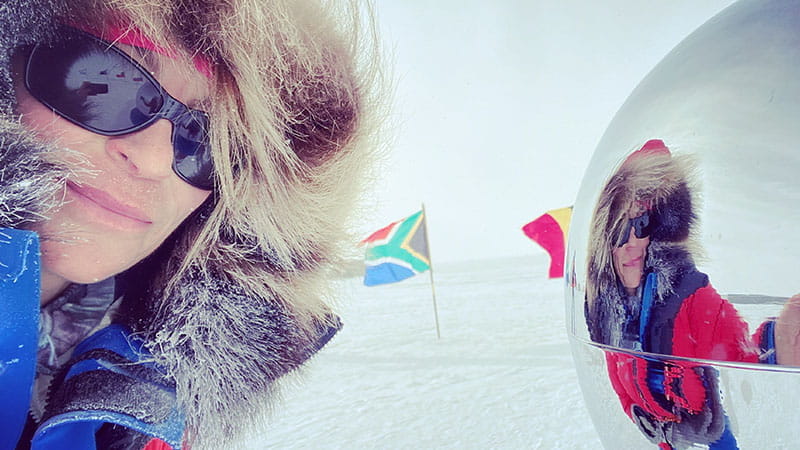
Buchanan is now working to complete the Explorer’s Grand Slam, which is the Seven Summits combined with the last-degree ski to the North Pole and South Pole.
Meghan Buchanan takes a selfie, Dec. 31, 2021, after a seven-day ski to the South Pole during her expedition.
When back down at sea level, she manages a team of systems engineers at Raytheon Intelligence & Space. Buchanan said she joined RI&S in 2019 because she was looking for a company that embraced non-traditional skills and assets.
“Because of all the challenges that I’ve had to endure, I think it’s made me a better leader. I feel that I am more patient and empathetic because of my struggles and pain,” Buchanan said. “I am not cookie-cutter and never have been. I have had to learn to work around my disability and find creative solutions. I don’t give up on projects, and I don’t give up on people.”
She said Raytheon Intelligence & Space doesn’t consider her dyslexia as a disability but instead considers it a strength.
“Some engineers aren’t trained in communications or conflict resolution. I’ve had to overdevelop my communication skills to compensate for my learning disability,” Buchanan said. “This has turned into my greatest strength. It’s allowed me to have tough conservations and reach solutions quickly and effectively.”
“When you’re told every day that you can’t, and when you finally have that belief in yourself, what a freeing, amazing feeling that is. I literally feel limitless.”
Meghan Buchanan | Raytheon Intelligence & Space
Buchanan found Denali her most challenging and rewarding climb of the Seven Summits because climbers are on their own.
“You are unsupported on that mountain,” she said. “There are no porters, no Sherpas. You must put in the work. You’ve got a 50- to 60-pound pack on your back and then pulling an equally heavy sled behind you. Denali doesn’t care if you’re a man or a woman, if you weigh 120 pounds or 220, what your net worth is or how many social media followers you have.
“You are treated the same, and she will either show you grace or chew you up,” Buchanan said. “Denali makes you face yourself; it’s so rewarding to achieve that climb. ”
Summiting Everest, though, tops her list of climbs. Taking six to eight weeks to climb, acclimatize and summit, Everest takes tremendous emotional and mental resilience to endure. More than 300 climbers have died trying to reach the top.
She said that Everest, with its frigid and low-oxygen atmosphere, “eats you away.”
“Of course, there’s the physical strain, the dedication, but it’s also the mental and emotional strength that get you to summit or even get you through the training to get there,” Buchanan said. “You have to be comfortable with suffering. You have to get your [butt] kicked and get right back up the next day. You have to get yourself out of situations, and you need to be able to deal with it with positivity and integrity.”
After summiting Everest, she knew that her last Seven Summit climb in Australia would be a cakewalk. She was going from the tallest summit to the shortest, the hardest climb to easiest.
“You don't have to be a rocket scientist to climb Mount Everest,” Buchanan said. “But it helps to have rocket fuel for blood and a lot of grit to reach the summit.”
Coincidentally, Buchanan’s personal mantra is GGRIT, which stands for Gratitude, Growth, Resilience, Integrity and Tenacity.
She said, “I own those attributes – that’s why I'm doing this, because I can. Because I can push through anything.”
So what’s next for Buchanan after the Explorer’s Grand Slam?
“Maybe the seven beaches of the world,” Buchanan said, laughing. “Seriously, though, I have been thinking a lot about K2. While it is the second highest mountain in the world, it’s the most challenging and most dangerous.”
Then added, she is writing an inspirational, self-help book based on the GGRIT principles, which have helped her overcome obstacles throughout her life and share her life experiences with audiences.
“The thought of doing Everest probably 10 years ago – gosh, no,” she said. “I would never do that, but then I was like, ‘No. You know what? I got that fire in my belly. I can do this.’ And that is so much of what I want to share with other people.
“It’s like, ‘What is your Everest?’ It doesn’t have to be the actual Mount Everest. It could be someone with disabilities getting through high school, getting that college education, just believing in himself or herself enough to do it – and that's a goal right there, just believing in yourself,” Buchanan said. “That’s so hard, especially for people who suffer from disabilities. When you’re told every day that you can't, and when you finally have that belief in yourself, what a freeing, amazing feeling that is. I literally feel limitless.”

